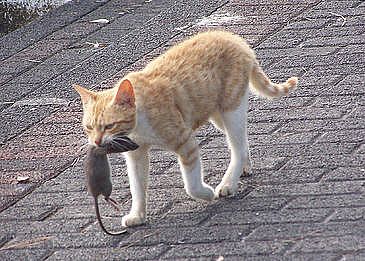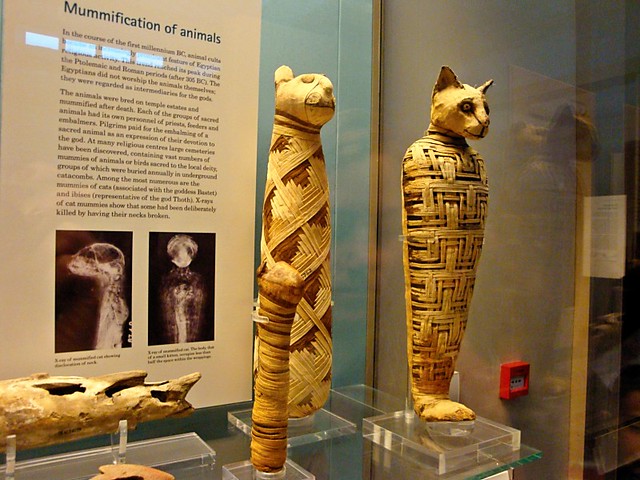General Discussion
Related: Editorials & Other Articles, Issue Forums, Alliance Forums, Region ForumsWestern Civilization was built on Cats
Last edited Tue Aug 7, 2012, 11:04 AM - Edit history (4)
The rise of agricultural civilization was, in many ways, a calamity for human beings. The average human didn't get back to the caloric intake or nutritional quality of a hunter/gatherer diet until the 1800s. Many of our deadliest diseases were developed from living alongside domesticated food animals. And agriculture made big monarchies, lower classes and slavery practical.
(Agriculture also allowed for population growth, though the individual was worse off. It is a more efficient use of land in terms of the number of persons an acre can keep alive. That raises a central ethical question... is the society that allows the greatest population automatically a benefit to people? Does people mean individuals alive today, or the species of people? Does more people equal a benefit for people? Is existing a benefit? Mst of us choose to continue existing, so we seem to like it. Anyway, those questions are outside the scope here.)
But whatever the merits and demerits of agriculture, without agriculture we would not have had civilization, as we conceive it. So a mixed blessing, but still a blessing.
Anyway... even though big agricultural civilization was bad for individual people it was sure to prevail in any scenario because agriculture allows a society to support security forces. Division of labor. Workers grow "surplus" food which can then be diverted to a military/police/overseers that do not produce food. (I put quotes around surplus because the "surplus" is all food production above subsistence level for the agricultural workers... all food that the state or a class can appropriate while still maintaining an agricultural society. The poor survive on monotonous high-starch diets, not because that is good but because it is possible. Starch is easy to dry and store.) But no matter how much agriculture sucked it had to prevail because an agriculture based military will always prevail over a foraging society. And the advantage grows on itself because the civilization is capable of technological and infrastructure advances.
Since the Nile flooded a lot, ancient Egypt saw its intricate, labor intensive irrigation systems wiped out periodically. To survive such a year requires enough surplus labor to rebuild the whole irrigation system before the next growing season. You can survive one bad year, but not a string of them. In years the Nile does not flood that surplus labor pool builds pyramids and such... and fights wars. (Much like China, Egypt was always getting conquered and assimilating the conquerors. I am not saying that Egypt itself conquered everyone in empire fashion. But Egypt was a center of power around which everything revolved for a couple of thousand years because it had the capacity to feed a military. The empire on the way up was always the empire that controlled Egyptian resources. The Roman empire was dependent on Egypt. Without that imported grain the city of Rome could not feed even itself. That's why Cleopatra was important.)
And key to all of this is food storage. The ability to store grain meant that the whole civilization didn't die away in a bad flood year. It also meant that an army could operate as an army.
In ancient Egypt they stored massive amounts of grain.
What is the problem with storing massive amounts of grain? Rodents! (And tribbles, of course.) Massive grain storage without cats was probably a non-starter. They didn't have our traps and posions and such. Just tons of cats policing the grainaries in ways humans cannot. (I am not a very rural person, but my impression is that cats were guarding silos on farms everywhere until fairly recently.)

If I recall correctly, the modern domesticated cat came from a African wild cat from the general Egypt/Sudan area.
And, as the animal that made their entire way of life possible, ancient Egyptians came to think highly (and religiously) of cats, and mummified countless thousands of them. (What's an after-life without cats?)
 ?
?
villager
(26,001 posts)Joseph and his brothers, and storing up for lean years, I believe?
And a little about forgiveness in there, too. But significant enough to be the main "plot point" that ends "Book One" of the Bible a.k.a. Torah...!
Because of her relation to the Nile Egypt could not survive without stored grain, because it only takes one year with zero food to end any civilization.
A civilization is only as strong as its worst year.
Zalatix
(8,994 posts)See this post by Lunatica:
http://www.democraticunderground.com/10021071829#post8
In short: self-contained skyscraper farms could use solar power to regulate its climate, collect and sterilizes water.
These kinds of systems would be resistant to horrible weather. The next step from here would be to research nanotech-based pesticides... millimeter-sized robot swarms that could see and remove crop-eating pests. Byebye insecticide!
aquart
(69,014 posts)
cthulu2016
(10,960 posts)ieoeja
(9,748 posts)Pharoah has a dream. Joseph interprets the dream to mean that Pharaoh should take 1/7th of each year's crop as taxes. On the 7th year the people could sell themselves to Pharaoh to be fed.
msongs
(67,417 posts)cat-holics lol
cthulu2016
(10,960 posts)Cats have an incredible capacity for population explosion so they should be able to keep up with the rodent population, but after the cat-growth overwhelms the rodent-growth you have a bunch of starving feral cats which were probably not a treat to be around.
So medieval towns may have had a notion that a lot of cats are a negative. They kill chickens, for instance. And pre spay-and-neuter they make life miserable. Noisy!
Also, those Norwegian rats carrying the pague fleas might have been pretty big. Cats can kill rats, of course, but they are more effective against mice. (I know a lot of dogs used to be "ratters," which was probably less of a fair fight.)
But I also think about famine years... when times are tough people will eat the cats. So a lean year would see an ironic increase in rats, competing with the humans for the little available food.
In any event, we know that keeping a cat as a pet (as opposed to just having cats wandering around) was a good way to get burned as a witch.
REP
(21,691 posts)There is even a modern celebration that reenacts the killing of cats by throwing them off a building (stuffed cats are used now).
Some historians have posited that the mass killing of cats may have played a part in the spreading of Y pestis. There is some evidence that those who kept cats were less likely to die of the Plague.
Cats have been domesticated before Egypt; there is evidence that they were companions of humans 10,000 years ago (the evidence is cat burials with grave goods - obviously not the remains of dinner).
Voice for Peace
(13,141 posts)TlalocW
(15,384 posts)Because along with cats, juggling is depicted in some pyramids hieroglyphics.

TlalocW
UnrepentantLiberal
(11,700 posts)http://www.essortment.com/history-domestic-cats-21154.html
Ancient Egyptians stored their food in woven baskets and their storage areas were infested with rodents. The rodent problem was quite a plague; much of the Egyptians' food and grains were eaten or destroyed by the rodents, who easily chewed through the reed containers. Rats and mice swarmed the Egyptian cities, and with no traps, poisons or other devices to fight against the rodent population, there was not much the Egyptians could do about it. At some point the African Wildcat, a small yellow cat with black stripes, the ancestor of modern day domestic cats, began coming into the cities to feast on the abundance of rodents. The Egyptians welcomed their new neighbors when they realized that the Wildcats were killing off the rodents. Many people began leaving small scraps of food outside their houses to encourage the Wildcats to hunt at their home. The cats soon began to stay in the cities because there they had more than enough to eat. The cats were also protected from being hunted because their predators in the wild would not dare come near humans. The cats and humans seemed to be well matched for each other.
REP
(21,691 posts)Here's one cite (I'm on my iPad - I have other references at home)
http://www.scientificamerican.com/article.cfm?id=the-taming-of-the-cat
Unlike other domesticated creatures, the house cat contributes little to human survival. Researchers have therefore wondered how and why cats came to live among people.
Experts traditionally thought that the Egyptians were the first to domesticate the cat, some 3,600 years ago.
But recent genetic and archaeological discoveries indicate that cat domestication began in the Fertile Crescent, perhaps around 10,000 years ago, when agriculture was getting under way.
The findings suggest that cats started making themselves at home around people to take advantage of the mice and food scraps found in their settlements.
joeybee12
(56,177 posts)Humans essentially brought the Plague upon themselves by their ignorance.
aquart
(69,014 posts)But they wouldn't have been much help with the fleas anyway. What shocked me was how many domestic animals also died of the plague.
The Persecution of Cats
Cats came under suspicion for a variety of reasons. Unlike dogs, they did not behave subserviently toward humans. This was considered unnatural, because it violated the biblical view that humans should have dominion over animals. Also, cats were very active at night and engaged in loud, raucous mating rituals. Though cats had always behaved in this manner, to the superstitious minds of the Middle Ages, cats were practicing supernatural powers and witchcraft. Most accused witches were older peasant women who lived alone, often keeping cats as pets for companionship. This guilt by association meant that roughly a million cats were burned at the stake, along with their owners, on suspicion of being witches.
In the early thirteenth century Pope Gregory IX (1145–1241) declared that a sect in southern France had been caught worshipping the devil. He claimed the devil had appeared in the form of a black cat. Cats became the official symbol of heresy (or religious beliefs not advocated by the church). Anyone who showed any compassion or feeling for a cat came under the church's suspicion. By the beginning of the fourteenth century, Europe's cat population had been severely depleted. Only semi-wild cats survived in many areas.
In 1347 the bubonic plague swept across Europe. Called the Black Death, it killed twenty-five million people (nearly a third of Europe's population) in only three years. Thousands of farm animals died as well, either from the plague or from lack of care. The death rate peaked in the warm summer months and dropped dramatically in the wintertime because the plague was being spread to humans by fleas on infected rodents. The plague revisited Europe several more times over the next few centuries. In addition, millions of people are thought to have suffered from food poisoning during the Middle Ages because of the presence of rat droppings in the grain supply. Centuries of cat slaughter had allowed the rodent population to surge out of control.
http://www.libraryindex.com/pages/2149/History-Human-Animal-Interaction-MEDIEVAL-PERIOD.html
the fleas have preferred cats to humans too? So if there were fewer cat hosts the fleas would have gone for humans. At least that's what veterinarians always told me, fleas preferred furry mammals to humans. Interesting, I didn't know animals died of the plague too.
Festivito
(13,452 posts)TuxedoKat
(3,818 posts)likes to roll on the driveway every day. Unfortunately we still get fleas in the house occasionally though.
Festivito
(13,452 posts)The fleas returned when I forgot to buy and apply the monthly medication at the back of the head. I split a dose between two cats. They hate me for a day, until it dries. Then all is forgiven. $10 for 3 months is certainly worth it, and is less money and trouble than 3 vet visits for $100.
Egalitarian Thug
(12,448 posts)the Devil's agents, so those not too busy dying of the plague spent a lot of their time killing the animals that would have saved many of them.
Hayes23
(2 posts)Matariki
(18,775 posts)Warren DeMontague
(80,708 posts)Although personally I prefer

JHB
(37,160 posts)It was a whole Puss-n-Brew tango.
Warren DeMontague
(80,708 posts)Cats were like the original bouncer.
LiberalLoner
(9,762 posts)1-Old-Man
(2,667 posts)And of course dogs had nothing to do with it.
I agree. Tools, fire, the invention of the wheel.
cthulu2016
(10,960 posts)But since the piece is mostly about the implications of the ability to store grain cats are pertinent to it.
Of course dogs have played a bigger role in the broad story of mankind, being our true companion animals. And without tools there wouldn't be much agriculture in the first place.
Left coast liberal
(1,138 posts)...my cats still have the job and leave me the trophies.
![]()
Skidmore
(37,364 posts)have never forgotten it.
Arkansas Granny
(31,518 posts)trotsky
(49,533 posts)also enabled people to be artists, writers, architects, police, and scientists. It's not fair to paint it as just enabling the use of military force.
cthulu2016
(10,960 posts)You are quite correct that the benefits of civilization are vast.
But the ability to have a large security force is a decisive competitive benefit.
I am not saying that a standing army is all that civilization is good for. Far from it. (A mixed blessing is still a blessing)
I am saying that in the competition for land the agricultural civilization would win for that reason, even if civilization was worse in ever other way. (Which it is not.)
trotsky
(49,533 posts)cthulu2016
(10,960 posts)The OP is just late-night top-of-the-head musings, and is not precise. In the contests between agricultural civilization and hunter-gatherers agriculture was always certain to win because of its ability to generate surplus resources, regardless of any other factor. Even if (hypothetically) the hunter/gathers were wise and beautiful and happy, it wouldn't help in the face of a civilization that can afford to have military forces going 365 days a year.
But that doesn't mean that the Egyptian or Chinese flag always won. They frequently lost to blitzkrieg type mobile military. But what that really accomplished was just a churning of leadership while Egypt and China remained Egypt and China. Unless a marauding invader was inclined to dismantle the implicit great military power in the agricultural civilization he now controlled, it will remain an agricultural civilization.
So I should not have said that Egypt (or China) was bound to expand, as a political unit, but rather that agricultural civilization was bound to expand.
And I should have noted that one conquest prevented was conquest by the people themselves. Standing security forces are ultimately what keeps the peasants tilling the land for benefit of the aristocracy, giving up their surplus which then feeds the standing security forces, and so on.
Harald Baldr
(8 posts)now I love them even more.
Cats over governments any day . .
bahrbearian
(13,466 posts)
FarCenter
(19,429 posts)Cats? Maybe one or two -- then they go on break.
HopeHoops
(47,675 posts)pscot
(21,024 posts)and feral cats were attracted by the rodents. A symbiotic relation developed between cats and farmers. Makes sense.
BOG PERSON
(2,916 posts)not kitty cats
yellowcanine
(35,699 posts)
AnnieBW
(10,429 posts)
Of course, cats have never forgotten when they were worshiped as Gods.
Odin2005
(53,521 posts)And in their behavior and physiology they still betray their desert origins. They can even drink ocean water because their kidneys are extremely efficient.
eShirl
(18,494 posts)what a good girl
![]()
so glad she sleeps on the foot of the bed all night, or I'd never get to sleep now
RZM
(8,556 posts)I've heard it argued that the main function of early domesticated dogs was as alarm systems. We attained 'behavioral modernity' about 50,000 years ago, but didn't settle down until 15,000 years ago. Nicholas Wade has argued that violence was the reason. We were too busy killing each other to stop and smell the roses. But dogs represented an important advantage in that regard. They could alert humans to a hostile presence before any human sentry could. This (along with agriculture and I guess cats) meant that we could stay in one place with the ability to fend off raiders who wanted to take us out.
Perhaps this is the reason that all of these tens of thousands of years later, we can't get our neighbor's dog to shut the hell up - way back when, they were bred to be loud and annoying because that could mean the difference between life and death.